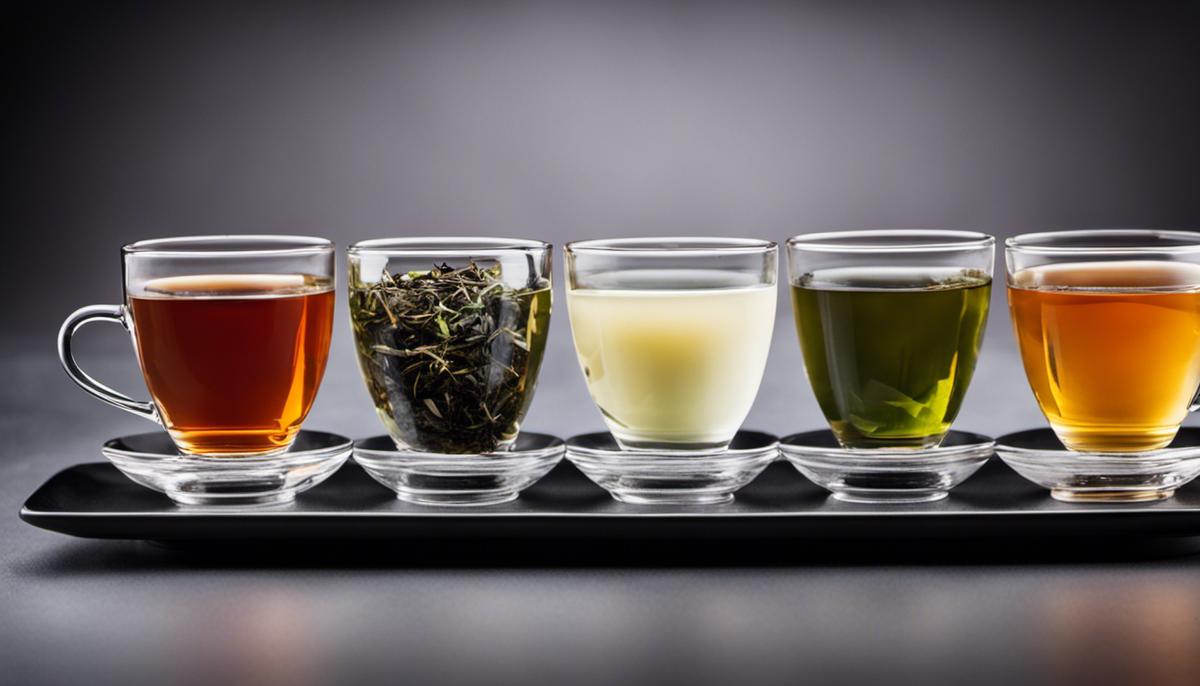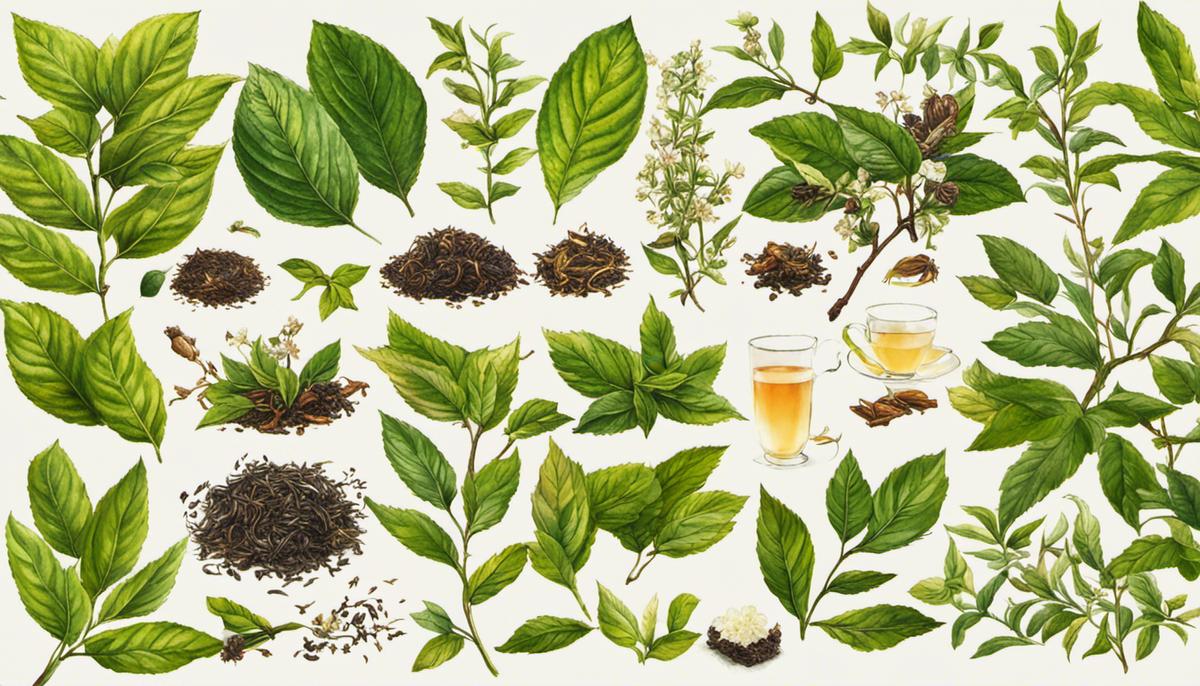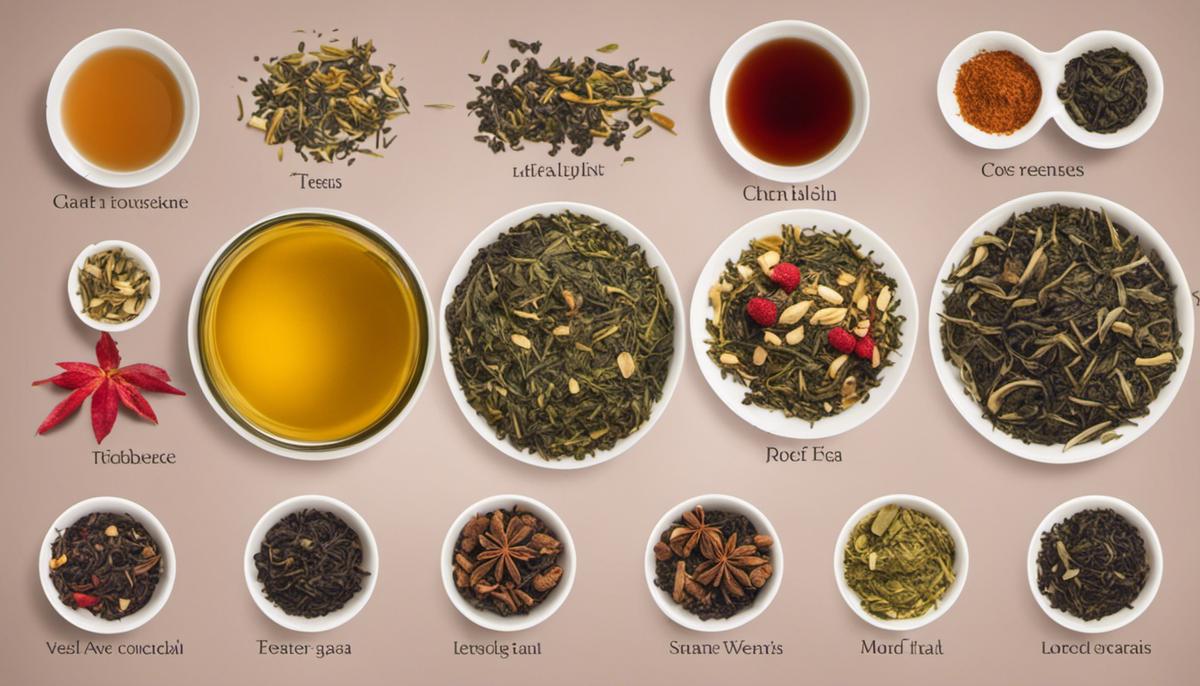Maintaining the health of the arterial system is vital in ensuring a robust circulatory system, which is fundamental to overall well-being and longevity. It is widely recognized that the food we consume plays a significant role in administering critical nutrients to our arterial system. An often overlooked but potent source of such nutrition can be found in an array of teas, which not only have a comforting essence but are brimming with compounds beneficial to arterial health. This exploration will venture into the depth of tea’s nutritional attributes and the potential impactful role it can play in promoting clean arteries, free from the damaging echoes of cardiovascular diseases. We aim to examine this topic through a critical lens, by integrating comprehensive scientific research studies into our discussion.
Table of Contents
Understanding the Arterial System and Its Health
The Crucial Interplay Between Tea Consumption and Arterial Health
Arterial health is an essential facet of systemic wellness and longevity. The intricate web of vessels that permeates our bodies functions not just as a transport mechanism for nutrients and oxygen, but is fundamentally instrumental in the elimination of metabolic waste as well. A healthy arterial system is characterized by elastic, unobstructed blood vessels capable of efficiently responding to the body’s fluctuating demands, while dysfunction in this critical network can pave the path for serious consequences, such as cardiovascular disease, stroke, and peripheral artery disease. Thus, maintaining the health of this system is of paramount importance.
Tea, a beverage lauded for its medicinal properties since ancient times, offers intriguing correlations to arterial health. Rich in bioactive compounds such as polyphenols, flavonoids and catechins, tea potentially holds a unique place in arterial health management. Research into the interconnections between tea and arterial health offers compelling insights into the potential benefits of daily consumption.
Tea, specifically green and black, have demonstrated antioxidative properties courtesy of their high polyphenol content. Polyphenols are potent antioxidants that help in mitigating oxidative stress, a crucial factor contributing to the buildup of arterial plaques, or atherosclerosis – a prime suspect in most cardiovascular disease. By neutralizing reactive oxygen species, tea polyphenols may retard the progression of atherosclerosis, thereby preserving arterial health.
Moreover, bioactive compounds in tea have been linked to an improved blood lipid profile. Raised levels of low-density lipoprotein (LDL), or “bad cholesterol”, have been associated with a heightened risk of heart disease. Research indicates that tea catechins may decrease LDL cholesterol levels, thereby potentially reducing the incidence of arterial blockages.
The antihypertensive effect of tea is another factor that commands attention. Hypertension or high blood pressure often leads to arterial damage and consequent cardiovascular complications. Studies indicate that habitual tea drinking, particularly green tea, could reduce blood pressure, thus offering a protective effect for the arteries.
Furthermore, tea polyphenols may contribute to endothelial function – an integral aspect of arterial health. The endothelium, the innermost layer lining the arteries, plays a pivotal role in vascular homeostasis. Evidence suggests that tea polyphenols can enhance endothelial function, which in turn, could improve vascular reactivity and maintain blood flow.
However, as with all scientific observations, these links are open to additional study and interpretation. Various factors such as tea preparation, consumption rate, genetic predisposition, and lifestyle habits can influence the potential effects of tea on arterial health. Moreover, the precise mechanisms behind these benefits have yet to be fully elucidated. However, the promising correlations discovered thus far underscore the importance of continuing research efforts in this domain.
In sum, the evidence points towards a beneficial relationship between the regular intake of tea and improved arterial health. Together with balanced nutrition and regular exercise, drinking tea might well be an accessible and enjoyable strategy for maintaining the health of the arterial system. As we distill more knowledge from research, we broaden our opportunities to develop and refine preventive strategies and interventions, lending weight to the adage that understanding is indeed the first step to cure.

Types of Teas and Their Nutritional Components
In an exploration of the different types of tea and their nutritional quality, it’s crucial to take a scientific approach that enables the assessment of the potential impacts on arterial health.
Green tea, rich in catechins, particularly EGCG (epigallocatechin gallate), appears to offer significant cardiovascular benefits. Among these are suppressing inflammation, reducing oxidative stress, and even inhibiting the formation of blood clots, owing to its high antioxidant content. The high phenolic content of green tea contributes to its anti-hypertensive effects, assisting in maintaining blood pressure at healthy levels and preventing arterial damage.
Right behind green tea in terms of antioxidant and polyphenol content, we find black tea. Black tea undergoes a unique fermentation process resulting in compounds called theaflavins and thearubigins, which establish its distinctive color and flavor. Early studies suggest that these compounds may reduce cholesterol absorption in the gut, thereby aiding in maintaining healthy cholesterol levels. Theaflavins also exhibit anti-inflammatory properties, a factor that aids in the reduction of arterial plaque buildup.
Oolong tea, a partially fermented tea, displays a promising combination of compounds owing to its unique preparation process. It provides a bouquet of polyphenols, catechins, and theaflavins which have been associated with improved lipid metabolism and the reduction of atherosclerosis risk. Notably, the presence of a compound called “Quercetin” with potent antioxidant and anti-inflammatory properties adds to oolong’s cardiovascular health merits.
White tea, the least processed of all teas, avails a significant antioxidant potential. The epicatechin gallate (ECG) in white tea may help inhibit LDL oxidation, with implications for preventing the onset of atherosclerosis. Its relatively high concentrations of the amino acid, L-theanine, have been associated with stress reduction, and thus potential reduction of stress-induced arterial wear and tear.
Herbal teas, made from a variety of herbs, fruits, and spices, offer an unprecedented range of healthful compounds. While not traditionally considered ‘tea,’ their profiles vary hugely depending upon the composition. For instance, hibiscus tea has demonstrated potential for blood pressure reduction, while rosehip tea offers a notable source of Vitamin C, with its associated positive impact on arterial health via enhanced collagen production.
However, it is significant to state that the notion of ‘one fits all’ does not apply to nutrition. Both genetic predisposition and lifestyle factors should be considered when analysing the impacts of tea consumption on arterial health. This serves as a reminder that the advantageous effects of these teas should ideally form part of a more holistic approach to health, rather than being viewed as the ‘magic bullet’ against arterial disease.
Furthermore, it’s recommended to consume different types of teas in their natural form, refraining from adding sugar or dairy products that may offset the benefits.
The field of nutrition science continues to evolve, and in understanding teas’ nutritional profiles relevant to arterial health, we illuminate a healthy path traced by thousands of years of traditional tea cultures. This path requires further research, but it is an intrinsically delightful and healthful journey nonetheless.

Analyzing Scientific Studies: Tea’s Impact on Arterial Health
As a continuation of the initial discourse, the conversation would be incomplete without acknowledging the individual types of tea and their unique contributions to arterial health. Among them, green tea, black tea, oolong tea, white tea, and varied herbal teas each possess distinct qualities worthy of examination.
Finding fame for its manifold health benefits, green tea harbors an impressive portfolio of polyphenols and flavonoids. Efficacious in bolstering arterial health, studies underscore the undeniable link between green tea consumption and reduced rates of cardiovascular disease. Grounded in scientific evidence, long-term consumption of green tea has been associated with risk reduction for infarction and ischaemic heart disease, rendering it a proactive choice for those seeking the duality of consumption and prevention.
Diverging slightly, black tea, another precious gem in the collection, comes forth with its own set of beneficial characteristics. Studies unveil the potential of black tea to mitigate LDL cholesterol levels and decrease arterial plaque buildup. Its consumption not only mitigates the threat of coronary heart disease but also helps maintain a conducive blood lipid profile, paving a smoother path towards arterial health.
Oolong tea is another contender in this cadre, with the spotlight on its favorable impact on lipid metabolism. Embracing center stage in many scientific studies, oolong tea demonstrates considerable properties in the reduction of atherosclerosis risk. Offering a tantalizing prospect to concurrently combat obesity and enhance arterial health, it offers a multidimensional lens to approach cardiovascular well-being.
The spotlight now moves towards white tea. Nurtured with minimal processing, it retains a substantial chunk of its antioxidant potential. Holding the promise to prevent atherosclerosis, it proffers a different trajectory through which arterial health can be comprehended and preserved.
Even within the sphere of herbal teas, the health benefits differ markedly based on their composition. From chamomile to hibiscus, each type is infused with specific bioactive compounds that potentially proffer unique health advantages, garnering an enormous scope of research to fathom their role in bolstering arterial health.
However, impinging on these discussions, is the incontestable role of genetic predisposition and lifestyle factors. The role of tea in promoting arterial health does not negate the influence of these factors; rather, it intertwines with them, forming a complex mosaic, the understanding of which necessitates a constant navigation through the labyrinth of scientific studies.
Lastly, the importance of consuming teas in their purest forms resonates significantly, as the addition of sugar or dairy potentially dilutes the inherent health benefits, also echoing within the chambers of arterial health. By offering a pantheon of bioactive compounds, these teas, when consumed naturally, may aid in achieving the holy grail of atherosclerosis prevention and more importantly, overall arterial wellness.
Coming full circle, we find ourselves in the evolving field of nutrition science- a dynamic realm that continues to provoke audacity and intellectual curiosity. Unraveling the mystery of the direct effects of tea on arterial health thus persists as a critical challenge. Nonetheless, the progress made confirms tea’s place in the complex interactions nutritional interventions and human biology share. Conclusively, as one steeps in the world of research, it becomes evident that understanding teas’ impact on arterial health proves as intricate, yet as enticing as the elixir itself.

Recommended Teas for Arterial Cleanliness
Now, having established the foundational insights pertaining to arterial health and the beneficial properties of various teas, it is time to delve deeper and identify the most recommended teas for maintaining arterial cleanliness and overall health.
Abound in clinical studies, Green tea stands paramount. It has been heralded for its ample cardiovascular benefits. The constituents of green tea, which include but are not limited to epigallocatechin-3-gallate (EGCG), facilitate efficient cholesterol metabolism, and discourage thrombosis formation, a crucial participating factor in the progression of heart diseases.
Black tea, in its robustness, holds an equally influential role in ensuring arterial health. Whilst the specifics may diverge slightly, black tea harbors theobromine, a compound endowing it with the potential to maintain conformable levels of blood pressure, complementing the arterial health by mitigating risks associated with high blood pressure.
To sidestep from the black and green polestars, Oolong tea cannot be overlooked for its distinctive attributes. The semi-oxidized tea leaves of Oolong serve an important function in weight management, demonstrating pivotal lipid-lowering effects, and thus diminishing the risk of atherosclerosis—a condition that can depreciate arterial cleanliness.
Meanwhile, white tea, despite being less prominent in general discussions, stands its ground with its notable antioxidant potential. Constituting a high level of catechins, white tea asserts protective effects against oxidative damage, an instrumental factor in cardiovascular diseases, including atherosclerotic processes.
Besides the enumerated Camellia sinensis teas, herbal varieties such as hibiscus and chamomile tea, deliver health benefits contingent on their unique constitution of bioactive compounds. While understanding their unique compositions necessitates extensive exploration and research, preliminary findings confirm their valuable contributions towards maintaining arterial health.
Yet it is vital to underline that any consumption of tea must sidestep excessive additional ingredients that could counter the benefits, such as processed sugar or high fat dairy products. Simple steeping and brewing methods tend to maintain the integrity of the bioactive compounds and their health effects.
In summary, teas inclusive of green, black, oolong, white, and particular herbal varieties prove efficacious for arterial health. However, the intricate matrix warrants comprehensive studies that consider genetic variations, lifestyle factors, and interactions amongst the myriad components of the nutritional biodiversity. It is the amalgamation of these factors that paves the way towards understanding teas’ impact on arterial health, a path that is continually unraveled by the tireless engagement within the dynamic domain of nutritional science. Thus, endorsing tea in alliance with a broader wellness initiative can truly harness its potential in maintaining arterial health. Undoubtedly, the exploration of this salient subject unfurls an advent towards a most promising horizon in tea and nutritional research.

Overall, the journey to clean arteries through tea consumption offers a multifaceted approach to health and wellness. Despite the unique characteristics of different teas, all offer notable health benefits crucial for arterial health through their rich nutritional profiles. The regular intake of tea can contribute significantly to maintaining cleaner arteries and consequently protect against various cardiovascular diseases. While our recommendations are grounded in careful scientific analysis, it is pivotal to remember that these suggestions should be integrated into a balanced diet and lifestyle. Consistent daily habits, combined with the choice of tea that best suits your taste and health needs, can make an enormous difference in keeping arteries clean and fortifying the heart in the longer run.

Rajan Moonbeam is a dedicated health writer with a Master of Public Health (MPH) degree. Specializing in holistic wellness and preventive care, Rajan combines scientific research with natural approaches to health, offering readers practical advice on living their healthiest life. His work is a beacon for those seeking to navigate the path to well-being with integrity and balance.

